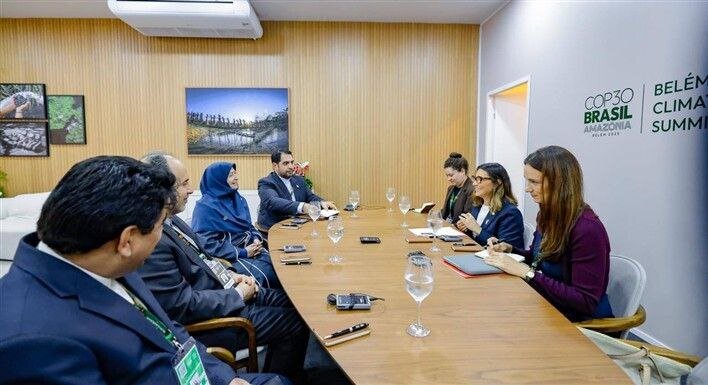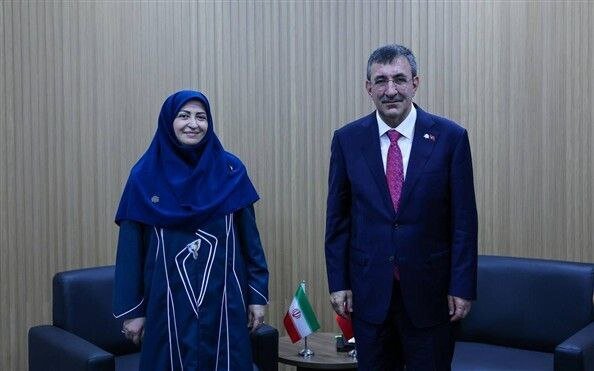Iran, UN underscore climate justice

TEHRAN – The head of the Department of Environment (DOE), Shina Ansari, and the secretary general of the United Nations, Antonio Guterres, have emphasized the significance of climate justice in the face of coercive sanctions.
The officials met on the sidelines of the 2025 United Nations Climate Change Conference, known as the 30th Conference of the Parties (COP30), which is scheduled to be held in Belém, Brazil, from November 6 to 21.
Referring to unilateral, cruel sanctions against Iran, Ansari said the environment sector needs to be protected against coercive measures, and international collaborations focusing on common global interests need to be pursued without any restrictions, IRIB reported.
For his part, Guterres affirmed the same view. Highlighting the significance of understanding the consequences of climate change on different countries, the official said climate justice and equal solutions to address the damage from climate change are among the main priorities of the United Nations’ sub-agencies.
The head of the DOE also held a meeting with the Brazilian first lady, Rosângela Lula da Silva, known as Janja. Lula da Silva highlighted the role of the two countries in regional and global arenas, calling for the expansion of ties between Brazil and Iran, particularly in social and environmental fields.

She expressed hope that Iran’s participation in COP30, act as a turning point to expand the growing relations between the two countries.
For her part, Ansari referred to the vast potential for cooperation, voicing Iran’s readiness to share experience and knowledge in addressing climate change. She said that the enhancement of environmental ties, along with other sectors, will foster constructive interactions between the two countries. The official also stressed the role of women and indigenous knowledge in conserving the environment.
During a meeting held between Turkish Vice President Cevdet Yilmaz and Ansari, the two officials reviewed previously reached agreements, during the global Zero Waste Forum, held in Istanbul, Turkey, from October 17 to 19, and underlined fostering relations in the environment sector as an effective factor in improving the environment in the region.

COP30 has brought together world leaders, scientists, non-governmental organizations, and civil society to discuss priority actions to tackle climate change.
It will focus on the efforts needed to limit the global temperature increase to 1.5°C, the presentation of new national action plans (NDCs), and the progress on the finance pledges made at COP29.
The COP30 Action Agenda will be organised around six key areas, reflecting the breadth and urgency of action needed to meet collective commitments under the Paris Agreement and previous COPs: Transitioning Energy, Industry, and Transport; Stewarding Forests, Oceans, and Biodiversity; Transforming Agriculture and Food Systems; Building Resilience for Cities, Infrastructure, and Water; Fostering Human and Social Development; and Cross-cutting Enablers and Accelerators.
Environmental diplomacy
Being transboundary, many complicated environmental challenges can be addressed through environmental diplomacy, which means negotiations among two or more countries.
Environmental diplomacy is used globally to settle problems such as conflicts over sources of energy, water, and climate change, IRNA reported.
The fact that all the countries share the same environment necessitates fostering environmental diplomacy to settle disputes over water resources, environmental pollution, and climate change impacts.
Environmental diplomacy is an effective and required tool to mitigate and eliminate the severe consequences by fair distribution of responsibilities among involved countries as they present their national interests and solutions.
Sand and dust storms (DSDs) are a typical example of meteorological hazards in West Asia, where many countries are involved, as some generate them and some others are affected by them.
SDSs hit countries such as Saudi Arabia, Iraq, Syria, Turkey, Iran, and sometimes parts of Azerbaijan, Turkmenistan, and even Afghanistan and Pakistan.
These dust particles have devastating impacts on respiratory health and ecosystems; they result in the closure of airports, schools, and offices, affect electricity transmission infrastructures, and bring about economic losses.
Removing pollution from the Aras River and securing the Hirmand River water rights, as well as some wetlands, are other examples where environmental policies have been used to resolve the conflicts.
Tehran Convention is a big achievement whereby the Caspian Sea littoral states protect the Caspian environment from all sources of pollution, but also targets the preservation, restoration, and protection of the Caspian Sea species and habitats.
Therefore, to mitigate climate change impacts and achieve sustainable development goals, environmental policy is required to be strengthened to help Iran, as well as its neighboring countries, benefit from available resources and secure our rights at the international level.
Ministry of Foreign Affairs, in cooperation with other executive bodies such as the ministries of energy, industry, and agriculture, as well as the Department of Environment, can establish a center to focus on specific missions and follow up on discussions and goals in line with national interests and improve the living conditions of citizens through environmental diplomacy.
MT/MG
Leave a Comment